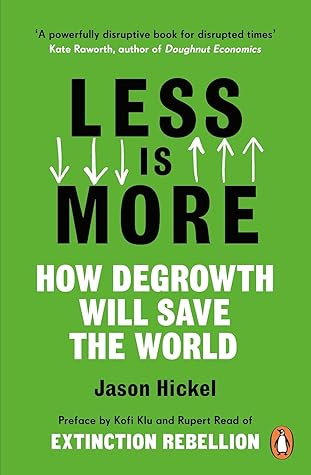More on this book
Community
Kindle Notes & Highlights
by
Jason Hickel
Read between
May 25 - October 4, 2022
Under capitalism, growth always requires new frontiers from which to extract uncompensated value. It is, in other words, intrinsically colonial in character.
GDP growth is, ultimately, an indicator of the welfare of capitalism. That we have all come to see it as a proxy for the welfare of humans represents an extraordinary ideological coup.
GDP growth is driving total energy demand up at such a rapid pace that these new fuels aren’t replacing the older ones, they are being added on top of them. The shift to oil and gas hasn’t been an energy transition, but an energy addition.
What brings a nation’s birth rate down? Investing in child health, so that parents can be confident their children will survive; investing in women’s health and reproductive rights, so that women have greater control over their own bodies and family size; and investing in girls’ education to expand their choices and opportunities. With these policies in place, population growth falls fast – even within a single generation.
The problem with economic growth isn’t just that we might run out of resources at some point. The problem is that it progressively degrades the integrity of ecosystems.
We conclude that decoupling of GDP growth from resource use, whether relative or absolute, is at best only temporary. Permanent decoupling (absolute or relative) is impossible for essential, non-substitutable resources because the efficiency gains are ultimately governed by physical limits. Growth in GDP ultimately cannot plausibly be decoupled from growth in material and energy use, demonstrating categorically that GDP growth cannot be sustained indefinitely. It is therefore misleading to develop growth-oriented policy around the expectation that decoupling is possible.
We tend to think of capitalism as a system that incentivises innovation. And it does. But, paradoxically, the potential ecological benefits of innovation are constrained by the logic of capital itself.
The richest 10% of the world’s population are responsible for more than half of the world’s total carbon emissions since 1990. In other words, the global climate crisis is being driven largely by the global rich.
And yet growthist narratives nonetheless have remarkable staying power. Why? Because growth serves the interests of the richest and most powerful factions in our society.
Instead of pursuing growth for its own sake and hoping that it will magically improve people’s lives, the goal must be to focus on improving people’s lives first and foremost – and if that requires or entails economic growth, then so be it. In other words, organise the economy around the needs of humans and ecology, rather than the other way around.
And by ideology I mean in the technical sense: a set of ideas promoted by the dominant class, which serves their material interests, and which everybody else has internalised to such an extent that they are willing to go along with a system they might otherwise reject as unjust. The Italian philosopher Antonio Gramsci has called this ‘cultural hegemony’: when an ideology becomes so normalised that it is difficult or even impossible to reflect on it.
Justice is the antidote to growth.
This is what we mean by ‘degrowth’. Again, degrowth is not about reducing GDP. It is about reducing the material and energy throughput of the economy to bring it back into balance with the living world, while distributing income and resources more fairly, liberating people from needless work, and investing in the public goods that people need to thrive. It is the first step toward a more ecological civilisation. Of course, doing this may mean that GDP grows more slowly, or stops growing, or even declines. And if so, that’s okay; because GDP isn’t what matters.
The majority of commodity production is geared toward accumulating profit rather than toward satisfying human needs. In fact, in a growth-oriented system, the goal is quite often to avoid satisfying human needs, and even to perpetuate need itself.
This is not the command-and-control fiasco of the Soviet Union, or some back-to-the-caves, hair-shirted disaster of voluntary impoverishment. On the contrary, it’s an economy that feels in key ways familiar, in the sense that it resembles the economy as we normally describe it to ourselves (in other words, perhaps as we wish it to be): an economy where people produce and sell useful goods and services; an economy where people make rational, informed decisions about what to buy; an economy where people get compensated fairly for their labour; an economy that satisfies human needs while
...more


